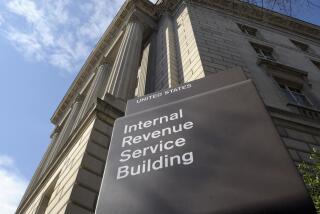Campaign Debts Aren’t Deductible
- Share via
Q: I ran for Congress two years ago and contributed most of the funds my campaign needed. I lost and the campaign was unable to repay the loans I had made. Now my accountant says I cannot write off those loans as a bad debt. I can’t believe it. Are there any circumstances under which campaign loans or debts would be deductible? -- D.B .
A: For all intents and purposes, the “loan” you made to your political campaign is considered a political contribution. And the IRS makes it clear that contributions to political campaigns or groups are not tax-deductible. It’s really just that simple, our experts say. Previous candidates have tried to argue that their campaign expenses should be deductible as a business expense since the costs were incurred as part of getting a job. The IRS didn’t buy that argument. The government’s position is that you contributed to a political campaign--it just happened to be your own--and you are not entitled to a deduction for it.
Certainly, there are circumstances under which campaign debts could be deductible. For example, if a business sold supplies to a campaign in an arm’s-length transaction and was not paid, the business would have a bad debt. But the transaction must be genuine and capable of withstanding the scrutiny of the IRS.
Sorry, No Break for Drunk Driving Costs
Q: Last year I was arrested for drunk driving and was required to enroll in a special traffic school, as well as pay nearly $1,200 in fines. Is any of this tax-deductible? The director of the traffic school thought his program might qualify as a medical expense because I was arrested for driving under the influence of alcohol, but he wasn’t sure. Can you help? --J.S.B .
A: Neither traffic fines nor traffic school fees are deductible. Legitimate medical treatment for alcohol or drug abuse can be a deductible medical expense if the treatment is prescribed by a physician and is administered by a qualified medical professional or program.
New Law on Start-Ups Is Not Yet in Effect
Q: In 1985 I invested money in a small computer company some friends started. In return I received shares of the company’s stock. The company went public in 1990 and the value of the shares jumped. I sold some of the shares last year and am wondering if my profit is considered ordinary capital gains or if there is some category of taxation available to people who take huge risks by investing in start-up companies. --G.F.
A: Your profit is considered ordinary capital gain and are subject to 28% taxation. However, the tax law passed by Congress last year does offer some of the benefits you allude to--but not until at least 1998. Under the new law, stock acquired after Aug. 10, 1993, in certain types of start-up businesses (primarily manufacturing) will be treated to a tax break upon its sale if the stock is held at least five years. The new law provides that only 50% of the gain from the sale of these shares will be subject to capital gains taxes, giving the taxpayer an effective tax rate of 14%--rather than the current 28%--on the profits.
Scheduling Your Mortgage Deductions
Q: For the past several years, I have rented out my home in Southern California. I also rent out a room in my condo in Northern California, where I live. I have been declaring mortgage interest deductions for both properties on both Schedule A under itemized deductions and on Schedule E for Supplemental Income from Rentals. I have never heard anything from the IRS, but a friend says I’m doing it wrong. Should I talk to the IRS about my returns and try to straighten things out?-- J.E.C .
A: Our advisers recommend that you never contact the IRS directly with such a question. Instead, if you are truly concerned, talk to your accountant to determine if you have done anything improper that requires your filing an amended tax return.
From your telling of the story, we cannot determine if you have made a mistake. Certainly, you cannot deduct the same mortgage interest payments on both Schedule A and Schedule E. However, our experts say you are entitled to write off half the mortgage interest on your Northern California condo on Schedule A, because you live there, and the remaining half on Schedule E, because you rent out that share. All of the interest on the rental home in Southern California should be listed on Schedule E.
You Get State and U.S. Break on Auto Fees
Q: In a recent column, you discussed the amount of the annual motor vehicle registration fees that could be deducted on our income taxes. Is this deduction only for federal taxes or does it apply to state taxes as well? I am a new resident of California.-- C.M.
A: The “license fee” portion of your annual registration payment may be deducted on both your state and federal taxes. This amount is clearly noted on the renewal form sent out each year by the state Department of Motor Vehicles.
If you didn’t keep the form, you can call your local DMV branch office to get this information, which varies from county to county and may change from year to year. Here are the current amounts residents of Southern California may deduct on their 1993 tax returns: Owners of non-commercial passenger vehicles registered in Los Angeles, San Diego and Riverside counties may deduct all but $35 of the annual renewal fee for each vehicle. In Orange County you may deduct all but $36, and in Ventura County you may deduct all but $34.
More to Read
Get the L.A. Times Politics newsletter
Deeply reported insights into legislation, politics and policy from Sacramento, Washington and beyond. In your inbox twice per week.
You may occasionally receive promotional content from the Los Angeles Times.










